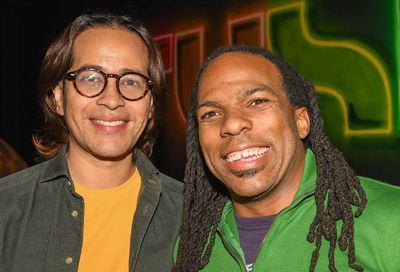My Fair Musical
Despite a palpable lack of chemistry between Eliza and Higgins, Arena's staging of ''My Fair Lady'' still delivers
Then there is the problem of the chemistry. She suggests not even the slightest hint of frisson toward Higgins, not when they war and not when they concede.
As Higgins’s sidekick and conscience, Col. Pickering, Thomas Adrian Simpson does well with the accent, offers good comic timing, and brings an unassuming authenticity to his upper-class Briton. He balances well the uncompromising Higgins. As long-suffering housekeeper Mrs. Pearce (and later the Queen of Transylvania), Sherri L. Edelen is nicely disapproving of her grumpy boss and provides the kind of presence that assures that all will remain comfortingly decent, despite the odd circumstances. As Eliza’s father Alfred, James Saito cuts an interesting figure and offers good comic timing, but his accent is another botched job.
Keeping early 20th century London’s life front and center, a cleverly choreographed, cohesive ensemble/chorus dance, sing and scamper through a simple but thoughtful set with skill and energy. Turning from raucous, streetwise ragamuffins into Ascot fashionistas and back again with humor and understatement, they are an entertaining, amusing and not-so-silent commentary. Standouts are Bev Appleton, Erin Driscoll, Rayanne Gonzales and Jennifer Irons.
In a smaller part that shines, Catherine Flye as Mrs. Higgins, the mother who watches with impatience and amusement her son’s irascible ways, owns her scenes with mesmerizing verve. As Eliza’s honey-toned suitor Freddy Eynsford-Hill, Nicholas Rodriguez is so convincingly fun and warm-blooded, one is left wondering why on earth Eliza would chose a life of keeping track of Higgins’s slippers versus one with Freddy crawling around the bedroom after her – but such are the vagaries of the human heart, apparently.



To Jan. 6, 2013
Arena Stage
Fichlander Stage
1101 6th St. NW
$64 to $109
202-488-3300
arenastage.org
Still, it is one of two odd little cliff-hangers. The other is the royal ball at which Higgins debuts his fully morphed Eliza. After wowing all concerned, she dances with Higgins’s nemesis, the famous linguist Zoltan Karpathy (played ably by Benjamin L. Horen). After some mimed conversation, the scene ends with an obviously alarmed Karpathy rushing off as if to denounce Eliza as a fraud. Yet when we return, it is to a post-ball victory party at which Higgins declares Eliza an unmitigated success. This disparity is never explained, at least not recognizably. Though it may be a minor matter in an evening that moves with energy and excellent pace, it is, like the question of, ”What happened to Freddy?” one that lingers.
For those who know this musical like the back of their hand, such issues will take a backseat to the more burning questions of whether the famous lines are delivered with spirit and the songs fly. Here they most certainly are and do. Whatever thoughts may be provoked by questions of class, sexism or confusing accents, before long someone is breaking into song, dance or both and for those who are here for their fix, it’s all about the joy.
Support Metro Weekly’s Journalism
These are challenging times for news organizations. And yet it’s crucial we stay active and provide vital resources and information to both our local readers and the world. So won’t you please take a moment and consider supporting Metro Weekly with a membership? For as little as $5 a month, you can help ensure Metro Weekly magazine and MetroWeekly.com remain free, viable resources as we provide the best, most diverse, culturally-resonant LGBTQ coverage in both the D.C. region and around the world. Memberships come with exclusive perks and discounts, your own personal digital delivery of each week’s magazine (and an archive), access to our Member's Lounge when it launches this fall, and exclusive members-only items like Metro Weekly Membership Mugs and Tote Bags! Check out all our membership levels here and please join us today!
























